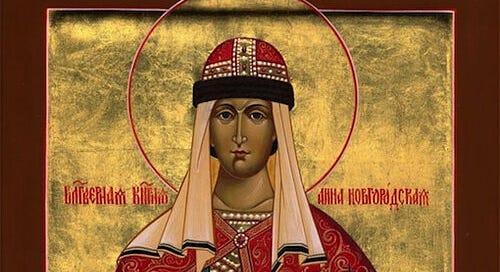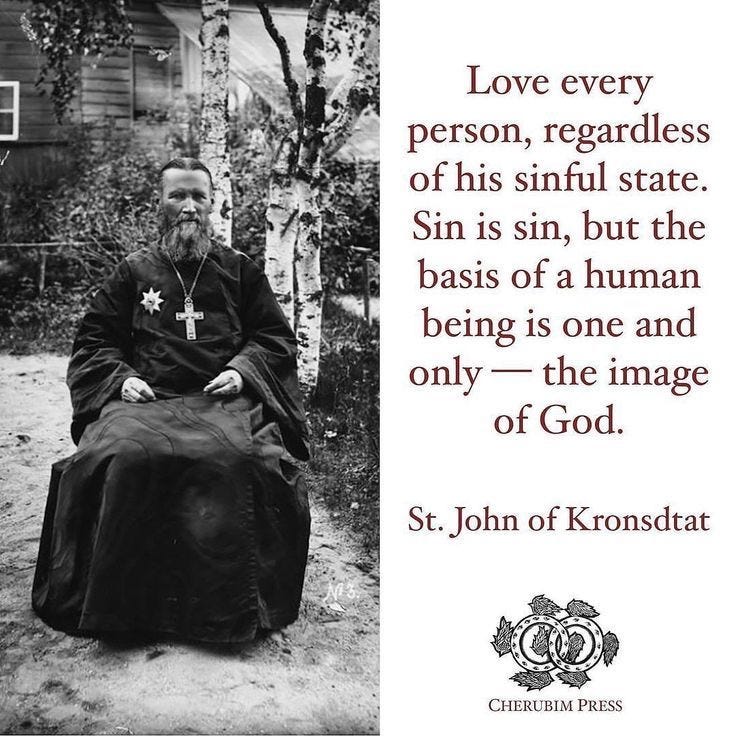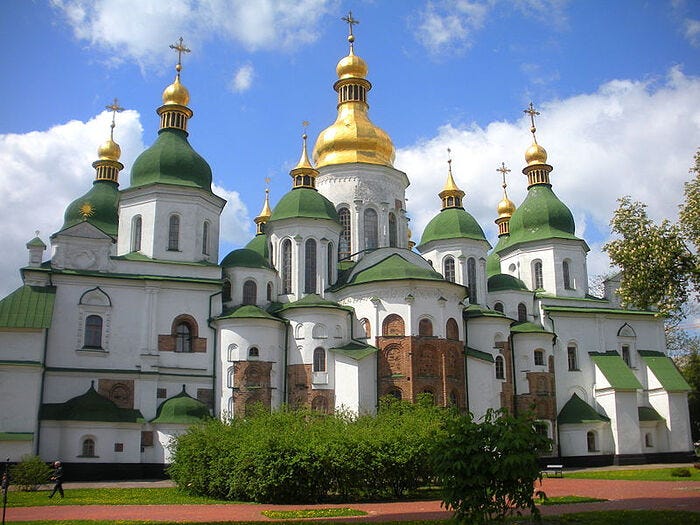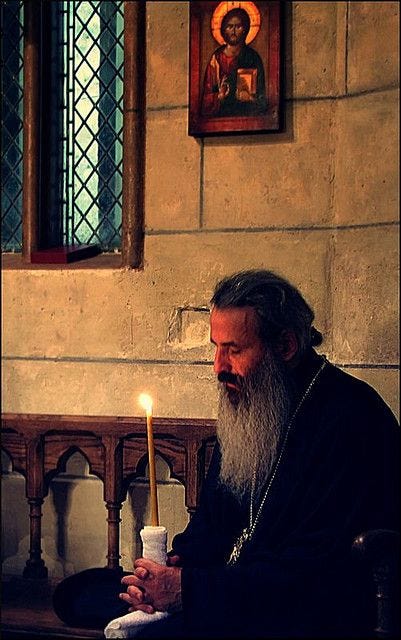2 Peter 1:20-2:9 (Epistle)
20 knowing this first, that no prophecy of Scripture is of any private interpretation,
21 for prophecy never came by the will of man, but holy men of God spoke as they were moved by the Holy Spirit.
1 But there were also false prophets among the people, even as there will be false teachers among you, who will secretly bring in destructive heresies, even denying the Lord who bought them, and bring on themselves swift destruction.
2 And many will follow their destructive ways, because of whom the way of truth will be blasphemed.
3 By covetousness they will exploit you with deceptive words; for a long time their judgment has not been idle, and their destruction does not slumber.
4 For if God did not spare the angels who sinned, but cast them down to hell and delivered them into chains of darkness, to be reserved for judgment;
5 and did not spare the ancient world, but saved Noah, one of eight people, a preacher of righteousness, bringing in the flood on the world of the ungodly;
6 and turning the cities of Sodom and Gomorrah into ashes, condemned them to destruction, making them an example to those who afterward would live ungodly;
7 and delivered righteous Lot, who was oppressed by the filthy conduct of the wicked
8 (for that righteous man, dwelling among them, tormented his righteous soul from day to day by seeing and hearing their lawless deeds) –
9 then the Lord knows how to deliver the godly out of temptations and to reserve the unjust under punishment for the day of judgment,
Mark 13:9-13 (Gospel)
9 But watch out for yourselves, for they will deliver you up to councils, and you will be beaten in the synagogues. You will be brought before rulers and kings for My sake, for a testimony to them.
10 And the gospel must first be preached to all the nations.
11 But when they arrest you and deliver you up, do not worry beforehand, or premeditate what you will speak. But whatever is given you in that hour, speak that; for it is not you who speak, but the Holy Spirit.
12 Now brother will betray brother to death, and a father his child; and children will rise up against parents and cause them to be put to death.
13 And you will be hated by all for My name’s sake. But he who endures to the end shall be saved.
Rt. Blv. Princess Anna of Novgorod (1056)
St. Anna of Novgorod (whose name was Ingegerd before baptism) was the oldest daughter of the Swedish King St. Olaf Skötkonung, who reigned from 994–1022, and was known as a most Christian king. In 1008, the king, his family, and his personal bodyguard all received Holy Baptism. Ingegerd received an exceptional education for a woman of her time—she studied the Holy Scriptures, literature, and history. She was a true daughter of Scandinavia of the era of the Vikings and so from her earliest days, she enjoyed great freedom, took part in the public life of her homeland, traveled, received guests, and was a master of using arms. Historical sources especially make mention of her keen mind, her bravery, and her great influence on those around her.
In 1017, Ingegerd’s father married her to someone who was “worthy of his friendship,” Grand Prince Yaroslav the Wise (1019-1054). As a dowry, she brought the city of Aldeigjuborg (Old Ladoga) to Russia. She took the Orthodox name Irina. Once she became the Grand Princess of Kiev, she used all of her strength of heart and soul, all of her gracious gifts, to serve her new homeland, and was a faithful helper and advisor to her husband in his affairs. Once, when a hired Norwegian guard rebelled and asked the Grand Princess to be an intermediary between them and Yaroslav, she agreed, but warned them that she would defend her husband’s interests. When Mstislav of Tmutorakan, the Grand Prince’s brother, rose up against him with his host, Irina challenged him to settle the argument by a duel with her. Mstislav, however, answered that he wasn’t used to fighting with women and he gave in to his brother.
Irina had a lot of influence in establishing good relations with the countries of Northern Europe. She welcomed Edmund, Edwin, and Edward, the exiled sons of the English king, into Kiev, as well as Prince Magnus of Norway. He didn’t return home until the Grand Princess was convinced that the Norwegians would give him his father’s throne and respect his rights. At this point in time, the government of Rus’ played a decisive role in the life of Europe, and its influence and authority were stronger than ever. This was in large part due to the work of the Grand Princess.
The reign of Yaroslav the Wise and Irina was the highest period of Kievan Rus. Yaroslav laid out plans to set up Kiev, his capital, as “a city of God,” an earthly reflection of the Heavenly Jerusalem (Rev. 2:10). The Church of Holy Sophia became the center of Kiev. The entrance into this city of God’s Wisdom was through the Golden Gates, upon which a Church was built and dedicated to the Annunciation. Those who had recently been pagans now deeply venerated the All-holy Virgin, seeing her as the temple of God’s wisdom. Because of this, the feast day of The Cathedral of Holy Sophia in Kiev was the Nativity of the Theotokos.1
Hesychasm: A Gift for our Times
Abba Arsenios [Praja], one of Neophytos the Recluses’ closest disciples, left a testament to his disciple:
“My son, I leave you the divine gift of hesychasm as an inheritance, as a blessing transmitted from Abba Neophytos the Recluse who was made worthy of the divine gift of the mystical practice of hesychasm. I leave you the inheritance of this gift as a talent. Be careful to not bury it, but to give it to moneychangers to multiply it and acquire tenfold interest, so as to not extinguish the mystical flame of the practice of hesychasm. Keep the candle of hesychasm lit and do not worry that you seem to be alone. Abba Neophytos the Recluse prophesied that there will be thousands who follow the mystical path of hesychasm. Changes in the world will be difficult, but just as amazing will be the spiritual rebirth of many. The mystical practice of hesychasm will descend from the mountains and caves into the heart of cities. And many young people, apparently ignorant, will awaken to a spiritual life similar to that of old. This resurrection will be wondrous, exactly where death is believed to rule. The Most Holy Spirit will show you the power which surpasses all things. The mystical practice of hesychasm will blossom in the desert of many hearts, which will then become heaven incarnate. I leave you the blessing of hesychasm, which you must keep lit in your own candle as a spark from which many others may light theirs. Do not try to figure out how this miracle will take place; the mystery of the practice of hesychasm will be the mystery of our world’s future. The times that are to come will be the most terrible confrontation between light and darkness, between the spirit of life and death. But the power of light will be so strong that it will surpass all natural laws. Take part in the great, spiritual blaze of this mystical practice. I leave you this blessing, and may the gift of our Lord Jesus Christ be with you and all seekers of this divine mystery. May the Most Holy Spirit protect you. Amen.”
–Quoted by Mother Siluana Vlad, from a book by Fr. Ghelasie of Frăsinei
This week’s calendar reminders:
Monday 2/10: Matins 8:30 am; Stewards Meeting 6:30 pm
Tuesday 2/11: no services or events
Wednesday 2/12: no services or events
Thursday 2/13: Matins 8:30 am
Friday 2/14: Matins 8:30 am
Saturday 2/15: Catechumen Class 4:30 pm; Choir Practice 5 pm; Great Vespers 6 pm
Sunday 2/16: Divine Liturgy 9:15am
CLICK BELOW to donate online:
Christ the Savior Orthodox Church is located in Southbury, Connecticut, and is part of the New England Diocese of the Orthodox Church of America.
Mailing address: Christ the Savior Church, 1070 Roxbury Road, Southbury, CT 06488
PLEASE DONATE to help our parish do the work of the Lord, thrive and grow, and extend the Kingdom of God. May the Lord bless your generosity!
Fr. Moses Locke can be reached at frmoseslocke@gmail.com












